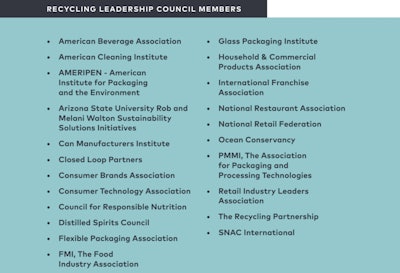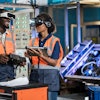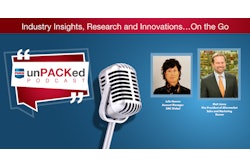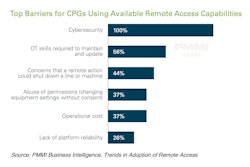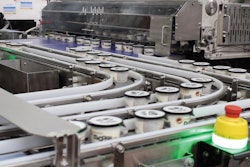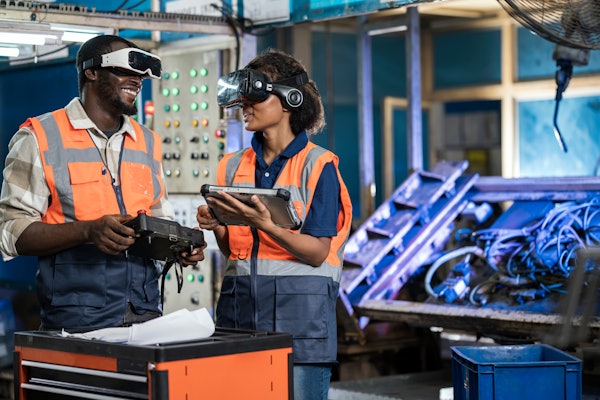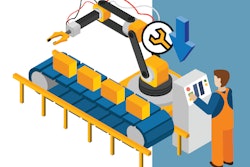In February, the Recycling Leadership Council (RLC), a broad coalition of stakeholders brought together to identify the federal government’s role in fixing the U.S. recycling system, released the Blueprint for America’s Recycling System. The report provides a vision for ambitious policy action that will move the U.S. toward a circular economy.
“Recycling in the U.S. is at a breaking point due to thousands of disparate systems, and the COVID-19 pandemic has only exacerbated the massive fractures in its foundation,” said Geoff Freeman, president and CEO of the Consumer Brands Association. “The time is now to solve this crisis, and Americans overwhelmingly want federal leadership. The Consumer Brands Association is proud to convene the Recycling Leadership Council and present its blueprint for how the federal government can be a positive force in modernizing and standardizing recycling across the country.”
As a part of the RLC and a large influence in packaging, PMMI, The Association for Packaging and Processing Technologies, pledged to work with the coalition on this effort.
“Packaging is vital to safeguard our food, protect our medicines, shield our purchases, and transport our goods, essentially protecting what keeps us happy and healthy,” said Glen Long, senior vice president, PMMI. “Because of packaging’s central role in our world, our industry has a responsibility to limit its environmental impact. The Blueprint for America’s Recycling System addresses the critical issue of recycling, by proposing ways to harmonize laws for clearer understanding, allowing consumers to do their part and the government to capitalize on technology and scale.”
The RLC’s blueprint outlines three areas where the federal government can make a meaningful difference in America’s recycling future, including data collection, standardization, and financing:
Create clear data collection and reporting requirements to further understand the problem and inform the creation of a system that works. There is a lack of standardized, quantifiable data across the country, leaving policymakers in the dark. We cannot manage what we cannot measure.
Develop national standards and definitions across the nation’s nearly 10,000 recycling systems, providing clear guidance to states and municipalities and taking confusion out of the process for consumers and packaging producers. Through standardization and harmonization, more and different types of materials can be collected, processed, and sold for value-added products or packaging.
Support states with targeted infrastructure investments, tax credits, and grants. Funding must be dedicated to the systems themselves, such as enhancing recycling infrastructure or educating consumers.
“Without focused leadership from the federal government, the system will remain fragmented, with waste becoming increasingly unmanageable and hopes for a cleaner, more sustainable future becoming impossible to realize,” said Meghan Stasz, vice president of packaging and sustainability at Consumer Brands. “There is a real opportunity for federal legislators to take this consensus, which is years in the making, and put it into actual legislation. These are ideas we can all get behind.”
The diverse members of the RLC, brought together by Consumer Brands in early 2020, represent organizations from consumer-facing industries, packaging companies, non-governmental organizations (NGOs), and the recycling ecosystem, united by their belief that sweeping change is imperative to fixing recycling in America and integral to the long-term health of the planet.
“When we were putting together the blueprint and thinking about what the federal government can do now to take this issue forward faster, we were able to identify a range of tools, but it doesn’t stop there,” Stasz said during a live virtual media event. “It’s not just the federal government that can do these things and everything gets fixed. Everyone needs to lean into the wheel here in a host of ways.”
Kate Krebs, director of industry affairs at Closed Loop Partners, a New York City investment firm focused on the circular economy, echoed Stasz’s comments during the live event, noting that this is a unique collaboration that is far more far-reaching than any current recycling initiative.
“I think the unique aspect of the blueprint work is that [it brings together] the trade associations that represent a broad array of America’s businesses, with the NGO perspective from the Ocean Conservancy, and the recycling partnerships that are invaluable and keep our work honest. To me, the infrastructure we address, whether it is data, incentives, or changes in public policy, is a collaborative effort that I don’t think we’ve [ever] seen take place. That is the exciting part, and I think the next step of direct engagement up on Capitol Hill will be vitally important to make this real.”
For the launch, the RLC was joined by bipartisan members of Congress, several of which were present for the launch of the Recycling Leadership Council.
“For our country to move forward and successfully address protecting our environment, we have to have a targeted approach,” said Rep. Anthony Gonzalez (R-OH-16). “I am pleased to see innovative policy ideas included in the Recycling Leadership Council’s Blueprint for America’s Recycling System. Congress must take a bipartisan approach when considering ways to minimize waste and protect our environment. I look forward to working with my colleagues in this Congress to encourage bipartisan and innovative approaches to recycling policies.”
